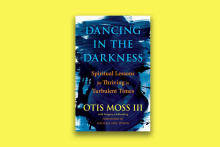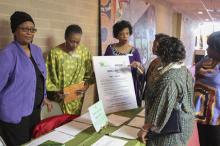Rev. Otis Moss III

In Dancing in the Darkness, Moss urges readers to move through the sorrow of the blues to what he calls “jazz politics” — one of collaboration, community participation, and dialogue: “If we had a jazz version of democracy in our politics, where each of us could play all our notes, even the blue notes, and contribute them to the music of the whole, then dialogue and honest debate would be the norm rather than demonization and incivility.”

“If you want a world where #BlackLivesMatter … if you want dignity for #Sikhs and #Muslims and the #99Percent, then #NetNeutrality is your cause too.”
So says Valarie Kaur, an American Sikh lawyer and filmmaker who thinks these popular hashtags are more than just clickbait: they represent the most pressing social justice issues of our time.
Interfaith leaders have long rallied for racial and economic justice and railed against police brutality. Now, with her Faithful Internet campaign, Kaur is calling on America’s religious communities to fight just as hard for net neutrality.

At Trinity United Church of Christ in Chicago, members and neighbors buy fruits and vegetables from a black farmers market and work in an organic garden named after botanist George Washington Carver.
They recycle their church bulletins, plan to renovate their building with a “green” roof and have purchased 27 acres for a community project that will include an urban farm.
“By any greens necessary,” the Rev. Otis Moss III, the church’s pastor, likes to say.
When it comes to African-American churches and a focus on the environment, Moss and his congregation are the exception rather than the rule.
Moss said many of his black clergy colleagues are less interested in conservation and tell him: “That’s your thing.”
Black congregations have tended to focus on their members’ basic needs — getting jobs, rearing children, pursuing higher education.